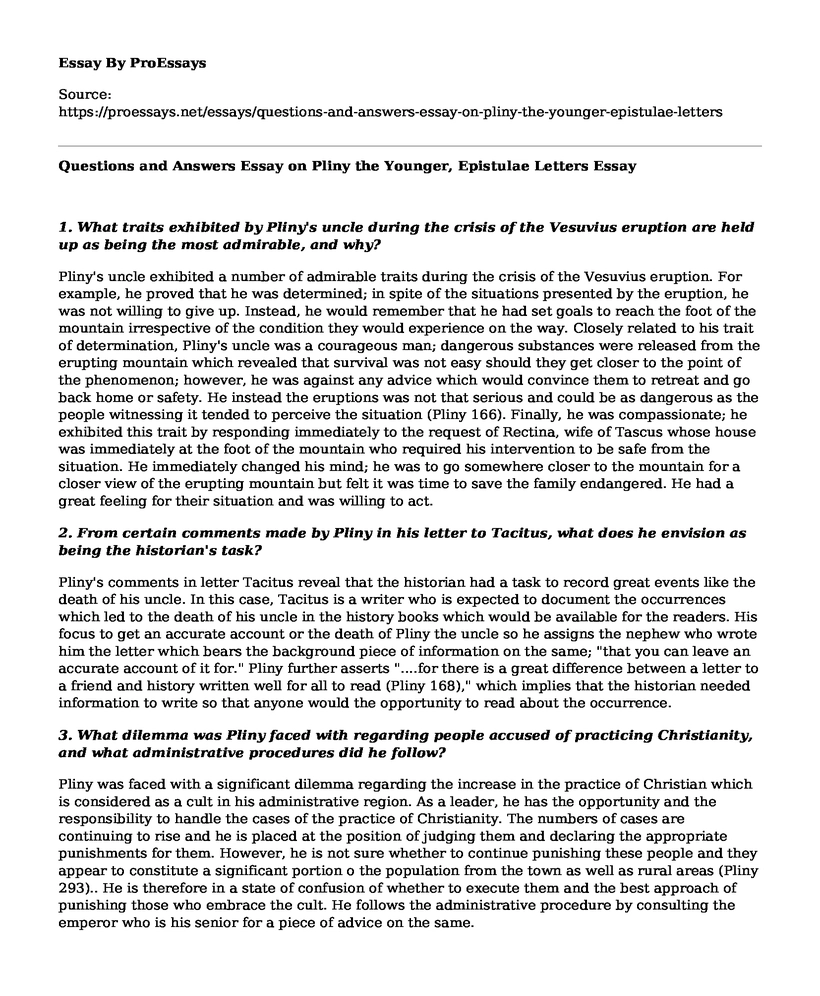1. What traits exhibited by Pliny's uncle during the crisis of the Vesuvius eruption are held up as being the most admirable, and why?
Pliny's uncle exhibited a number of admirable traits during the crisis of the Vesuvius eruption. For example, he proved that he was determined; in spite of the situations presented by the eruption, he was not willing to give up. Instead, he would remember that he had set goals to reach the foot of the mountain irrespective of the condition they would experience on the way. Closely related to his trait of determination, Pliny's uncle was a courageous man; dangerous substances were released from the erupting mountain which revealed that survival was not easy should they get closer to the point of the phenomenon; however, he was against any advice which would convince them to retreat and go back home or safety. He instead the eruptions was not that serious and could be as dangerous as the people witnessing it tended to perceive the situation (Pliny 166). Finally, he was compassionate; he exhibited this trait by responding immediately to the request of Rectina, wife of Tascus whose house was immediately at the foot of the mountain who required his intervention to be safe from the situation. He immediately changed his mind; he was to go somewhere closer to the mountain for a closer view of the erupting mountain but felt it was time to save the family endangered. He had a great feeling for their situation and was willing to act.
2. From certain comments made by Pliny in his letter to Tacitus, what does he envision as being the historian's task?
Pliny's comments in letter Tacitus reveal that the historian had a task to record great events like the death of his uncle. In this case, Tacitus is a writer who is expected to document the occurrences which led to the death of his uncle in the history books which would be available for the readers. His focus to get an accurate account or the death of Pliny the uncle so he assigns the nephew who wrote him the letter which bears the background piece of information on the same; "that you can leave an accurate account of it for." Pliny further asserts "....for there is a great difference between a letter to a friend and history written well for all to read (Pliny 168)," which implies that the historian needed information to write so that anyone would the opportunity to read about the occurrence.
3. What dilemma was Pliny faced with regarding people accused of practicing Christianity, and what administrative procedures did he follow?
Pliny was faced with a significant dilemma regarding the increase in the practice of Christian which is considered as a cult in his administrative region. As a leader, he has the opportunity and the responsibility to handle the cases of the practice of Christianity. The numbers of cases are continuing to rise and he is placed at the position of judging them and declaring the appropriate punishments for them. However, he is not sure whether to continue punishing these people and they appear to constitute a significant portion o the population from the town as well as rural areas (Pliny 293).. He is therefore in a state of confusion of whether to execute them and the best approach of punishing those who embrace the cult. He follows the administrative procedure by consulting the emperor who is his senior for a piece of advice on the same.
4. To what extent and in what manner does the Emperor both praise and criticize Pliny in his letter of reply?
The emperor referred to a letter to him from Pliny and the response had both praises and criticisms based on his reaction to the practice of Christianity. The emperor noted that Pliny rightfully laid a general rule of dealing with the case of the practice. He used a general formula which he did not modify which would have rather led to biased treatments. He was therefore strict and would punish anyone confirmed to be practicing Christianity. However, the emperor criticized some of his actions; he was against the use of pamphlets by Pliny, which was rather circulated anonymously (Pliny 295). According to the emperor, the use of these documents to accuse people of Christianity was a wrong approach to handling the issue in question.
Work Cited
Pliny, Gaius Plinius Caecilius Secundus. Epistulae. 2nd ed., Brepols Publishers, 1923, pp. pp. 166-168, 293-295.
Cite this page
Questions and Answers Essay on Pliny the Younger, Epistulae Letters. (2022, Dec 02). Retrieved from https://proessays.net/essays/questions-and-answers-essay-on-pliny-the-younger-epistulae-letters
If you are the original author of this essay and no longer wish to have it published on the ProEssays website, please click below to request its removal:
- Essay Example: Women Rights in the Play A Doll's House
- The 'Power of Money' as Discussed in 'Raisin in the Sun' Essay
- Racism in a Raisin in the Sun - Critical Essay
- "Love in L.A." Clash of Culture Theme Analysis Essay
- Essay Sample on Love & Obedience in 1984: Winston & Julia's Rebellion Against the Party
- "Heart of Darkness" by Joseph Conrad - Literary Analysis Essay
- Essay Sample on Romantic Love in Shakespeare's







